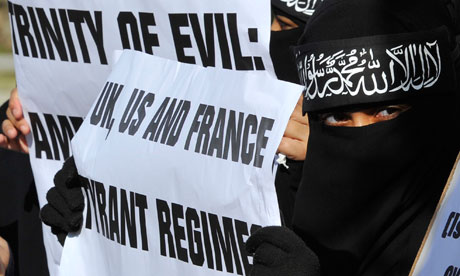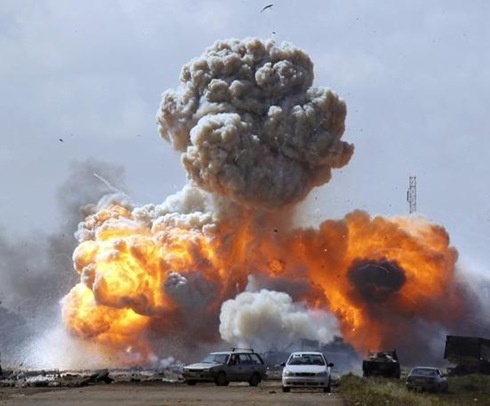
Protesters outside the Ministry of Defence in London show their opposition
to the international coalition's involvement in Libya.
Photograph: Toby Melville/Reuters
Downing Street is battling to hold together the international coalition opposing Muammar Gaddafi's actions amid signs of Arab unease at the scale and impact of western-led military operations in Libya, divisions within Nato over the no-fly zone, and a rising tide of global criticism.
A spokesman for David Cameron said the prime minister had spoken by telephone to Amr Moussa after the Arab League's secretary general expressed concern about civilian casualties caused by British, American and French air attacks which, he suggested, exceeded their UN mandate. The Gaddafi regime claims dozens of civilians have been killed and hundreds wounded in the past two days.
Cameron and Moussa "agreed that the protection of civilians was paramount", the spokesman said, adding that Cameron had assured Moussa the coalition was "working with targeting to avoid civilian deaths".
The foreign secretary, William Hague, said he was also in touch with the Arab League chief: "I think too much was made of Amr Moussa's comments. I will be talking to him again today. I talked to Arab foreign ministers yesterday. I did not detect in them any weakening of their commitment."
Speaking in Cairo after a meeting with Ban Ki-moon, the UN secretary general, Moussa said he respected security council resolution 1973, passed last week, which authorised the creation of a no-fly zone over Libya and the use of "all measures necessary" to ensure Gaddafi halted attacks on civilians.
The resolution was agreed by a majority vote after the 23-member Arab League endorsed calls for a no-fly zone. Diplomats say Arab support was crucial in persuading the US and other countries to back the resolution - co-sponsored by Britain and France - and in ensuring China and Russia did not veto it.
Moussa said: "The Arab League position on Libya was decisive and from the first moment we froze membership of Libya ... Then we asked the United Nations to implement a no-fly zone. We respect the UN resolution and there is no conflict with it, especially as it indicated there would be no invasion but that it would protect civilians from what they are subject to in Benghazi."
But reprising his previously expressed concerns about the impact of the air strikes on civilians, Moussa added: "We will continue to work on the protection of civilians. We urge everybody to take this into consideration in any military action."
Despite evident pressure to tone down his remarks, Moussa confirmed he had called an emergency meeting of Arab League ambassadors on Tuesday to discuss Libya. He reiterated his view that while the league had backed a no-fly zone, it had not supported attacks on Gaddafi's armed forces and military and communications infrastructure, as carried out during Operation Odyssey Dawn over the weekend.
Concern about the depth and longevity of Arab commitment to the Libyan intervention also focused on the failure, so far, of any Arab country to directly contribute personnel and military hardware, despite earlier assurances of support.
Qatar's state news agency reported that the Gulf state would contribute four jet fighters to the no-fly operation but they have yet to show up in theatre. Other Arab states, such as Saudi Arabia and the United Arab Emirates, which have said they are supportive, have declined to say what if anything they are doing to help.
Egypt, the Arab world's most populous state which is still grappling with the effects of its recent revolution, has said it will not get involved - although there have been unconfirmed reports that it has allowed the smuggling of arms to Libyan rebels across its western border.
Firing another warning shot across the coalition's bows, Abdul Rahman bin Hamad al-Attiyah, secretary general of the six-nation Gulf Co-operation Council, stressed the aim of the Libyan operation must be limited to protecting civilians - and that it should not be seen as an invasion of an Arab country.
"What is happening now is not an intervention. It is about protecting the people from bloodshed," he said.
Worries among Britain's Arab allies that a hidden agenda lies behind the attack on Libya have been underscored the comments of Liam Fox. The defence secretary said an attempt to kill Gaddafi was "potentially a possibility". Demands by Cameron, Barack Obama and the French president, Nicolas Sarkozy, that Gaddafi stand down have also been widely interpreted as support for regime change.
Speaking en route to Russia, the US defence secretary, Robert Gates, distanced himself from Fox's comments, saying it was unwise to make promises that might not be deliverable.
Gates's remarks underlined another potential headache for Downing Street - Obama's determination to hand over direction and implementation of military operations in Libya to European and Arab countries, and possibly Nato, as soon as possible.
"It is pretty clear that we agreed to use our unique capabilities and the breadth of those capabilities at the front end of this process, and then we expected in a matter of days to be able to turn over the primary responsibility to others," Gates said. "We will continue to support the coalition. We'll be a member of the coalition. We will have a military role in the coalition, but we will not have the pre-eminent role," he said.
Asked who would be in charge once American commanders stood down, Gates said: "I think that there are a couple of possibilities. One is British and French leadership, another is the use of the Nato machinery, and I think we just have to work out the command and control that is most accommodating to all of the members of the coalition."
Efforts to give Nato a lead role in operating the no-fly zone remained in difficulty after Turkey, the only majority Muslim Nato member, effectively blocked an agreement on alliance participation on Sunday.
Speaking in Mecca on Monday, Recep Tayyip Erdogan, the Turkish prime minister, elaborated his country's misgivings.
"Our biggest desire is for this operation to be finished as soon as possible," he said. "Our biggest desire is for the Libyan people to determine their own future ... Now the issue is, is Nato going into operation? If Nato is going into operation, we have some conditions. Nato should recognise that Libya belongs to the Libyans, not for the distribution of its underground resources and wealth."
The Turkish foreign minister, Ahmet Davutoglu, raised legal objections. "There are legal procedures for the establishment of a coalition in an international operation. We take the view that for Libya, these were not sufficiently respected."
Erdogan's suggestion that western actions were influenced by interest in Libya's oil wealth reflected suspicions voiced by Arab commentators and Gaddafi himself, who has accused Britain and other countries of seeking to re-colonise Libya.
Erdogan said he had spoken to Gaddafi three times during the crisis. Turkey, which has investments in Libya reportedly worth $15bn (£9.2bn), has represented British interests there since British diplomats were withdrawn as the crisis worsened.
Other Nato countries oppose British and French policy in Libya, notably Germany and Poland. Speaking before European Union talks in Brussels, Guido Westerwelle, the German foreign minister, said the Arab League's criticism of the operation had vindicated Berlin's stance.
"If we see that three days after this intervention began, the Arab League already criticises it, I think we had good reasons ... for our concern," he said. "This does not mean that we are neutral, it does not mean we have any sympathy with Gaddafi, but it means we see the risks."
Complicating matters further, France is opposed to giving Nato an active role. It argues that the alliance's reputation has been damaged by Afghanistan. France has long resented Washington's leading role in Nato. Italy, in contrast, said it wanted greater Nato involvement, as a way of locking in the US. "No decision has been taken. Nato is continuing its work," a French foreign ministry official said as talks continued in Brussels.
Downing Street has not found much enthusiasm for its Libyan offensive within the broader EU, either, which is split like Nato on the issue. Catherine Ashton, the EU foreign policy chief, clashed with Cameron at an EU summit this month, suggesting he "hold his horses" over an intervention which, she predicted, would lead to loss of civilian life.
The EU foreign ministers' meeting on Monday focused instead on boosting humanitarian assistance and isolating Gaddafi. "We are looking at what more we can do in terms of economic sanctions, what more we can do for planning. The most obvious issue is humanitarian support," Ashton said.
Adding to the growing pressure on Britain and France, which were beginning to look slightly isolated, Russia's prime minister, Vladimir Putin, a long-standing critic of the west, joined China, India, Brazil and other leading developing countries in criticising the intervention. His comments appeared deliberately designed to inflame Arab and Muslim opinion.
"The [UN] resolution is defective and flawed. It allows everything. It resembles medieval calls for crusades," he said.
China, also highly critical, called a new meeting of the UN security council later on Monday to take a second look at Libya.
Questions continued to be raised about the duration of the allied engagement in Libya, how success will be defined, and when British forces might come home. Compounding Downing Street's discomfort, Henry Guaino, a senior adviser to Sarkozy, indicated there was no end in sight. The intervention, he said, was likely to last "a while".
Guardian.co.uk




















